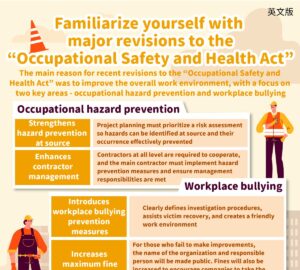(FWA 2025/03/20)In response to the demand for AI talent, Taiwan aims to train 200,000 AI Professionals in 4 Years, Attracting 25,000 Overseas Students Annually.
Taiwan is facing a long-term trend of declining birth rates and an aging population. In 2024, the number of births fell to 135,000, and the labor force is also showing signs of aging, indicating an anticipated future labor shortage. In recent years, intense global competition for talent, coupled with advancements in digital technology and the net-zero transition, has led to challenges where the quality and quantity of talent skills do not meet the needs of industrial development. These issues will constrain industrial upgrading and transformation, subsequently impacting economic growth and overall national strength.
Intelligent and digital transformation have become key drivers for enhancing corporate productivity. Analysis indicates that industries with high AI application rates show a labor productivity growth rate more than 4.8 times higher than other industries. Concurrently, jobs in low-carbon industries and those requiring AI professional skills are rapidly increasing. The demand for skills in AI-related positions is also evolving at an accelerating pace. Taiwan’s information services industry alone sees an average annual increase of approximately 5,000 to 6,000 new demands for AI professionals.
In response to the demand for AI talent, the Ministry of Economic Affairs plans to cultivate 200,000 AI professionals between 2025 and 2028, with an annual target of 25,000 domestic talents. Through the “2+4 Talent Cultivation Program” (two years of cultivation, four or two years of work in Taiwan), the plan aims to attract 25,000 overseas students annually to address labor shortages. This initiative began in 2024, and as of January this year, 62,488 individuals have been trained. Future plans also include integrating robotics and generative AI to boost productivity.
Regarding enterprise guidance, in 2024, a total of 2,228 enterprises were guided in adopting AI applications. For 2025, the Ministry aims to increase the AI application penetration rate in the manufacturing sector from 12.3% to 20% and provide new guidance to 10,000 more manufacturers. The overarching goal is to raise the AI application penetration rate to 50% by 2028.
※For any questions about work, life, or travel in Taiwan, the iTaiwan AI Genie is here to help.
國發會報告指出,台灣邁入長期少子女及高齡化發展趨勢,2024年出生數已減至13.5萬人,勞動力結構也呈現老化現象,未來可預期勞動力將出現短缺。近年國際間競逐人才激烈,加上數位科技及淨零轉型發展,導致人才技能之質量不符產業發展需求等諸多挑戰,將限縮產業升級轉型,進而影響經濟發展及整體國力。
智慧化、數位化已成為提升企業生產力的關鍵驅動力,分析指出,高AI應用的產業,其勞動力產值成長率相較其他產業高出4.8倍以上。同時,低碳排行業和具備AI專業技能之職缺正快速增長,且AI相關職位的技能需求變化速度也愈來愈快,臺灣資訊服務業對AI專業人才的需求平均每年新增約5~6千人。
因應AI人才需求,經濟部預計2025年至2028年培育20萬名AI人才,每年培養2.5萬名國內人才;藉由2+4人才培育方案(培育2年,留台工作4年或2年),規劃每年招攬2.5萬名海外生,解決國內人力不足問題。此項方案113年已先行啟動,截至今年1月共培訓6萬2,488名,未來也將藉由機器人與生成式AI的整合提高生產力。
企業輔導方面,113年共輔導2,228家企業導入AI應用,114年預計將製造業AI應用普及率由12.3%提升至20%,並新增輔導1萬家廠商,目標117年將AI應用普及率提升至50%。





